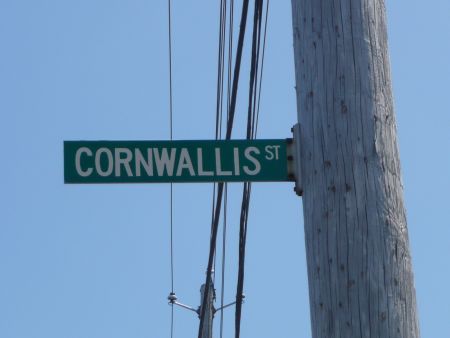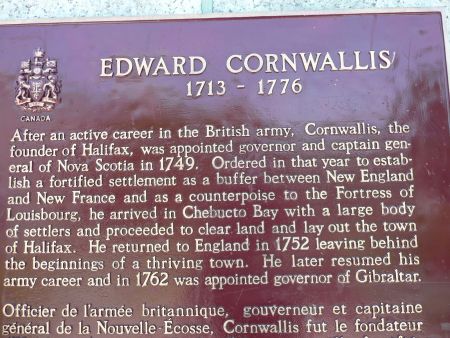Cheryl Leblanc-Weldon admits she never expected much to come out of the on-line petition she helped draft last summer.
In August 2008, the grade 3 teacher from Porter’s Lake started a campaign with Mi’kmaq elder and historian Daniel Paul to remove the name and effigy of Edward Cornwallis from public fixtures in Nova Scotia, from streets to schools to statues.
Cornwallis is commonly remembered as the British diplomat who founded the city of Halifax in 1749. But historical record shows that on October 1st of that same year, Cornwallis also put a bounty on the scalp of every Mi’kmaq man, woman and child in the province – a move tantamount to genocide, according to the petition authors.
This, argue Paul and Leblanc-Weldon, justifies the removal of Cornwallis’s name from its places of honour. “What we’re trying to do is ask the city to stop celebrating this man,” says Paul.
Since the petition’s launch it has garnered just over 2,000 signatures in English, French and Mi’kmaq. “It’s continued to tick along,” says Leblanc-Weldon. On October 1st, on the 260th anniversary of the infamous scalping proclamation, Leblanc-Weldon and Paul plan to formally present their signatures to Halifax Regional Council.
Not without precedent
There are precedents in North America where monuments with unsavoury names have been redesignated. It’s “pretty hard to find a Squaw Mountain or anything of that nature” nowadays, says Paul. “There used to be one in Maine.”
Sometimes, however, campaigns to rename public fixtures are met with stiff resistance. Leblanc-Weldon points to a case in Jacksonville, Florida, where a (mostly white) school board voted to maintain the name of Nathan Bedford Forrest High School – Forrest was a general in the Confederate Army during the U.S. Civil War who authored a massacre of surrendered black soldiers at the battle of Fort Pillow; he later was the first Grand Wizard of the Ku Klux Klan. The school that bears his name today has a majority of black students.
Reason for optimism?
Indifference has been a more common reaction than resistance to the Rename Cornwallis campaign, says Leblanc-Weldon. “In some cases it’s a racist thing. They say ‘[the Mi’kmaq] lost, too bad’… or ‘lots of people did things wrong, it was war, don’t judge it by today’s standards.’ Others say ‘it doesn’t affect my life,’ but when they find out about it they say ‘yeah, it should change.’”
Leblanc-Weldon is optimistic that the new NDP government in Nova Scotia will be more sympathetic to the petition than the outgoing Conservatives. In 2008, then-Heritage Minister Bill Dooks made little of the call to remove Cornwallis’s name in the province. “Changing a name does not change what happened," Dooks told reporters. "I cannot change the past."
So far the NDP’s official line is not that different from that of their predecessors, however. A prepared statement from David Denny, communications advisor for new Heritage Minister Percy Paris, reads: “The new government is focused on moving forward as a diverse society and fulfilling its key commitments to make life better for Nova Scotia families. This is not a matter under consideration or review by the new government at this time.”
The Halifax Regional School Board delivered a similar message regarding the renaming of Cornwallis Junior High School in South End Halifax: “I don’t believe there has been any request from the [School Advisory Council]” to rename the school, says Doug Hadley, communications coordinator for the HRSB. Leblanc-Weldon says Cornwallis principal Helen Castonguay was supposed to respond in May to a formal request regarding the name change, but has not done so. Castonguay could not be reached for comment.
Undeterred
Despite these cool responses, Paul and Leblanc-Weldon say they are not deterred from their campaign. Paul believes many more Nova Scotians would support the petition given the chance: “You need money to promote [an on-line petition]” he says. “Go out to most of our reserves, Indian reserves, and you’ll find most households don’t have a computer…you have to go out in person. I tried it once in Shubenacadie and got 100 signatures without any effort. It’s not that people don’t want to sign, it’s that they don’t have the means.”
Leblanc-Weldon also plans to approach some private entities about removing Cornwallis’s name from a variety of places; notably, the Westin hotel in Halifax has a Cornwallis room, and the local women’s chapter of the Canadian Progress Club, a national charitable organization, is called the “Halifax-Cornwallis” chapter.
(Leblanc-Weldon notes with irony that the latter named respected Mi’kmaq educator Sister Dorothy Moore as a “Woman of Excellence” in 2006.)
As for Minister Percy Paris, Daniel Paul says he hopes soon to “have a discussion with him.”
ben@mediacoop.ca




